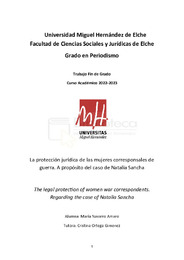Por favor, use este identificador para citar o enlazar este ítem:
https://hdl.handle.net/11000/29874Registro completo de metadatos
| Campo DC | Valor | Lengua/Idioma |
|---|---|---|
| dc.contributor.advisor | Ortega Gimenez, Cristina | - |
| dc.contributor.author | Navarro Amaro, María | - |
| dc.contributor.other | Departamentos de la UMH::Ciencias Sociales y Humanas | es_ES |
| dc.date.accessioned | 2023-10-30T12:03:39Z | - |
| dc.date.available | 2023-10-30T12:03:39Z | - |
| dc.date.created | 2023-06 | - |
| dc.identifier.uri | https://hdl.handle.net/11000/29874 | - |
| dc.description.abstract | Este trabajo analiza la protección jurídica existente en torno a los corresponsales de guerra cuando se encuentran en un conflicto nacional o internacional, y cómo puede afectar el género de las personas en unos países u otros. El objetivo es comprobar si realmente hay suficiente protección y si esta es efectiva a nivel general motivado por la gran cantidad de datos y noticias que se han revelado sobre las agresiones que sufren los periodistas en este ámbito. Los propósitos de la investigación son determinar los antecedentes, motivos, causas, y acciones de por qué ocurren tantos ataques y poder entender esa tendencia que está en auge. Para poder hallar esas explicaciones me he centrado en: los datos que ofrece la organización internacional Reporteros Sin Fronteras; una entrevista del experto jurídico del Comité Internacional de la Cruz Roja, Robin Geiss; una entrevista al presidente de la Federación de Asociaciones de Periodistas en España, Miguel Ángel Noceda y el testimonio de la corresponsal española, Natalia Sancha. Como resultados de la investigación me gustaría resaltar: la impunidad que se encuentra entre aquellas personas que atacan a los profesionales de la comunicación; que la ley no es suficiente para proteger a los comunicadores; la poca ayuda económica que reciben cuando se marchan a países que están en conflictos bélicos; no se les suministra protección, seguro y tratamiento psicológico ni durante la intervención ni cuando regresen a casa y muchos, por no decir todos, sufren estrés post traumático debido a lo que han visto y han vivido en esos territorios. En conclusión, todavía hay mucha discriminación hacía las mujeres, en general, y son usadas y violadas por guerrilleros, milicianos, policías locales, etc. La ley debe ser más exigente y rígida cuando se habla de ataques y asesinatos a periodistas por ejercer su trabajo y debe haber una coalición entre el mundo para condenar y criminalizar esas agresiones. | es_ES |
| dc.description.abstract | This work goes about the investigation made of the legal protection that exists towards the war correspondents when they are in a national or international conflict and how the gender can affect in some countries or others. It wants to prove if there is enough protection and if it is effective in a general level motivated by the big amount of data and news that have been revealed about the attacks that journalist suffer in that area. The objectives of the investigation are to determine the antecedents, reasons, causes and actions of why so many attacks occur and to be able to understand that booming trend. To can find that explications I focused in data that “organización internacional Reporteros Sin Fronteras” gives; an interview of the legal expert of “Comité Internacional de la Cruz Roja, Robin Geiss; and interview of the president of the “Federación de Asociaciones de Periodistas en España”, Miguel Ángel Noceda; and the testimony of the spanish correspondent Natalia Sancha. As a results of the investigation I would like to highlight: the impunity found among between those who attacks the communication professionals; that the ley is not enough to protect the communicators; the low economic help that they receive when they go to countries that are in war conflicts; they do not give protection, insurance and psychological treatment neither during the intervention nor when they return home and many, for not saying everyone, suffers post-traumatic stress due to they saw and lived in that territories. In conclussion, there is still a lot of discrimination against the women, in general, and they are used and raped by guerrillas, militiamen, local police men, etc. The law must be more exigent and rigid when it comes to attacks and murders of journalists for doing their work and there must be a coalition among the world to condemn and criminalize these aggressions. | es_ES |
| dc.format | application/pdf | es_ES |
| dc.format.extent | 56 | es_ES |
| dc.language.iso | spa | es_ES |
| dc.publisher | Universidad Miguel Hernández de Elche | es_ES |
| dc.rights | info:eu-repo/semantics/openAccess | es_ES |
| dc.rights.uri | http://creativecommons.org/licenses/by-nc-nd/4.0/ | * |
| dc.subject | Periodista | es_ES |
| dc.subject | corresponsal | es_ES |
| dc.subject | freelance | es_ES |
| dc.subject | mujeres | es_ES |
| dc.subject | asesinatos | es_ES |
| dc.subject | Journalist | es_ES |
| dc.subject | correspondent | es_ES |
| dc.subject | freelance | es_ES |
| dc.subject | women | es_ES |
| dc.subject | murders | es_ES |
| dc.subject.other | CDU::0 - Generalidades.::070 - Periódicos. Prensa. Periodismo. Ciencias de la información | es_ES |
| dc.title | La protección jurídica de las mujeres corresponsales de guerra. A propósito del caso de Natalia Sancha | es_ES |
| dc.title.alternative | The legal protection of women war correspondents. Regarding the case of Natalia Sancha | es_ES |
| dc.type | info:eu-repo/semantics/bachelorThesis | es_ES |

Ver/Abrir:
PER_TFG_NAVARRO_AMARO_MARIA.pdf
1,25 MB
Adobe PDF
Compartir:
 La licencia se describe como: Atribución-NonComercial-NoDerivada 4.0 Internacional.
La licencia se describe como: Atribución-NonComercial-NoDerivada 4.0 Internacional.
.png)